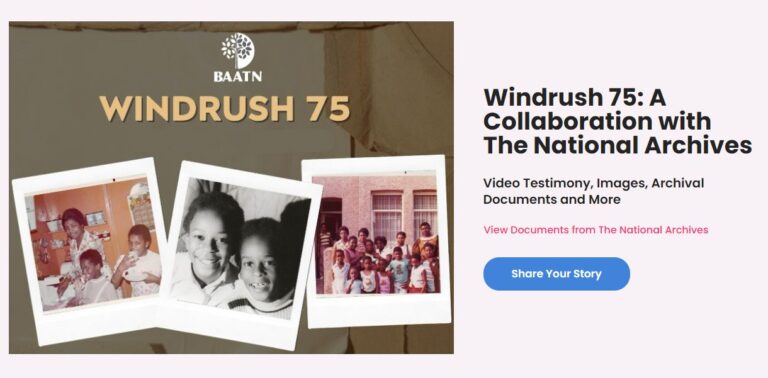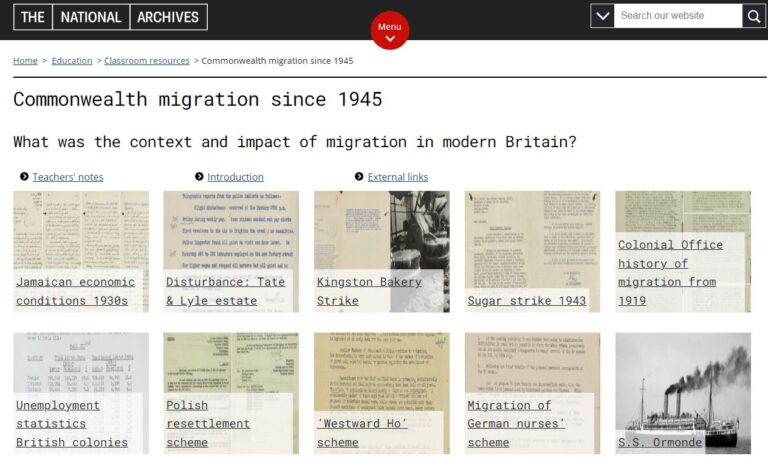My work this year as part of The National Archives’ Outreach team was to contribute to the community engagement strand of our summer programme marking 75 years since HMT Empire Windrush docked at Tilbury, Essex. As we come to the end of 2023, it may appear that the moment has been missed. But the Windrush moment was never just one point in time. It was a chance for many of us to take stock of something far more profound, which allowed us to invite discussions that took a longer and more nuanced view of the complex shifts that took place as older imperial identities were replaced at the end of the Second World War by a greater focus on national identities[ref]Imperial Citizenship, p212-3, Daniel Gorman [/ref].
Outreach led on two projects, one with Black African Asian Therapy Network (BAATN) and the other with Tamasha Theatre Company. Each, in their own way, captured more of the very personal responses to these significant moments in our national story. Building on the work Outreach has pioneered in the field of archives and emotions, we were involved early on in a dual process of both dissecting the record and the related histories, but also attuning ourselves to those viewing the record or sharing it with others. Doing so afforded opportunities that engaged participants not only in discussions about records and histories, but also about feelings, emotions and memories.
BAATN Windrush 75
Memories have played a key role in both projects. With BAATN, the aim was to reach out to the Windrush generation through links members of the BAATN community had, and capture this on a dedicated web page. A necessary part of this was to allow space for people to be seen and acknowledged, and at times this led to uncomfortableness.

One of the most intriguing areas of enquiry that arose from the project with BAATN related to how, despite elders providing poignant reminders of the past, coupled with extraordinary stories of how they remade their lives here, we always appeared left with a feeling that there was more that could be said, and that there were always silences and omissions.
Both as part of the evaluation process for the project but also to understand from the main organisers of the BAATN project how we could better read resources shared on the dedicated webpage, I conducted an interview with the organising group (Paula, Elaine, Eugene, and Fiona) that was both revealing and important.
For Paula, the collaboration with The National Archives, and the creation of the BAATN Windrush webpage was key to ensuring that an experience that is misunderstood and mispresented can be heard in the voice of those who story it is. Elaine, another member of the organising group drew out the point that you are not alone when these kinds of projects come together, you can see mirrored in others experiences and sharing’s something that allows you permission to share your story.
For the director of BAATN, Eugene, the videos and stories the group uploaded reminded him both of the extraordinary work ethic of many from the Windrush generation who worked so hard to establish themselves and their families here, mixed with a deep wound, in Eugene’s words a ‘slashed pride’, that was ever-present as so many men and women of the Windrush generation could not actualise their dreams and achieve their full potential. As part of the collaboration The National Archives also shared archival records we have as part of our collection with BAATN members.

I was interested in asking the organising group for responses to seeing these. One of the most heartfelt responses was from Fiona, who led the project on behalf of BAATN, as she noticed her resistance to the Windrush passenger list itself, saying there was something both historical and ancestral that was triggered when seeing the names of Black people on a ship’s register, being taken to a place unknown to them and receiving treatment they were unaware of and not ready for. Paula named something in response, which we have been exploring through our other projects such as on Indian Indenture, around the area of transgenerational trauma and how sometimes things move us at a much deeper level than we are conscious of when we encounter the archival record.
Tamasha
In our other Windrush 75 project we continued our now well-established association with audio drama with a new play by Mel Pennant, ‘A story told three times and still unfinished’, which premiered on Monday 30 October. The play was written following research at the archives and then a programme of outreach led by theatre company Tamasha with communities in London and Bristol.
Once again, the collecting of personal and community stories was key and helped inform the writing of the play. Mel’s play was a very moving exploration of a family story, following the story of Teanna Wright, an aspiring playwright commissioned to write a Windrush 75 play. Unable to find anything suitable in the archives, Teanna decides to interview her mother and finds out about many things that she did not know.
Mel’s play again raised a lot of questions and was particularly powerful in taking us to an area which Outreach are keen to explore more: the intersection between archives, memory and history. In reflecting on the process, two things stood out for Mel. Firstly, seeing what she had widely assumed was a call for people to come being challenged by seeing a lot of records that were far more equivocal. Secondly in hearing from the groups she met in London and Bristol about the impact on the generations left behind in the Caribbean. Mel’s play brilliantly weaved the very difficult emotions associated with the process of migration with reference to uncomfortable facts.
Breaking down barriers and opening up spaces
What both projects have achieved is to continue to forward our mission to be bold and break down barriers and open up spaces for further important conversations. At the end of Mel’s play one of her characters voices that the camera needs to turn 360 degrees and not just focus on the migrants on the boat, but on everyone else too. In that sense Windrush 75 is not just an immigrant story but a vital part of modern British history.
How about a project on the Polish people who came to the UK and stayed as well, they deserve recognition.
This is a fascinating & powerful way to compile or construe an archive- Psychosocial resonances offer a way to give meaningful voice to the everyday idea of “triggering “
A brilliant move to do research ‘with’ not ‘on’
people.